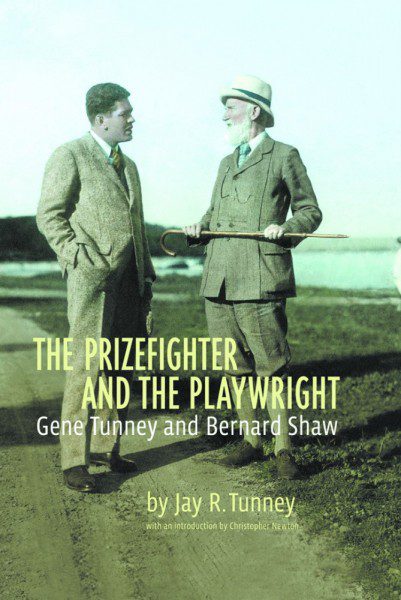 In December 1928, boxer Gene Tunney fulfilled his dream of meeting playwright George Bernard Shaw. The result was an unlikely friendship, powered, among other things, by Tunney’s love of literature and Shaw’s fascination with boxing.
In December 1928, boxer Gene Tunney fulfilled his dream of meeting playwright George Bernard Shaw. The result was an unlikely friendship, powered, among other things, by Tunney’s love of literature and Shaw’s fascination with boxing.
The Prizefighter and the Playwright: Gene Tunney and Bernard Shaw (Firefly Books, September 2010, $35, hardcover with jacket) pulls readers instantly and inescapably into this surprising relationship and the lives of its protagonists.
Written by Gene Tunney’s son Jay and enriched with never-before-published family photographs, letters, and interviews, the book paints a portrait of the boxer no one knew. It includes many revelations, new sources and letters from persons such as Charlotte Shaw and Thornton Wilder.
The book evolved from the acclaimed BBC radio series The Master and the Boy. On its surface, it is the story of the friendship between a professional athlete and a literary giant, offering intimate glimpses of the two. It is also a romance between a rich girl and a poor boy.
But The Prizefighter and the Playwright is more than that. It is also the riveting tale of a self-made man, a high school dropout who not only reached the acme of his sport, but also turned himself into a gentleman who could feel at home lecturing at Yale or discussing novels with the men who wrote them.
As the intriguing story unfolds, readers also are given painless lessons in history, learning for example what is was like to grow up as the son of impoverished Irish immigrants in New York City’s Greenwich Village in the first decade of the 20th Century and what it was like to be a celebrity in the heady 1920s, ducking the paparazzi who tormented the rich and famous even then.
Most of all, The Prizefighter and the Playwright is the story of two extraordinary men. Shaw was a Nobel Prize-winning playwright. Tunney, who defeated Jack Dempsey for the heavyweight crown in 1926 and 1927, was anything but a typical boxer.
As a young man, Tunney was befriended by a physician who introduced him to a world beyond his own, awakening a love of words and literature that would last throughout Tunney’s life. The boxer prepped for fights by reading Shaw, Shakespeare, Butler, Shelly and Maugham, trained himself to speak with erudition, and regarded fighting as a science rather than, as he put it, “assault and battery.”
None of these traits endeared him to sportswriters or boxing fans who rooted for Dempsey and booed what they considered Tunney’s pretensions. Tunney’s choices did, however, win him entree into a world of words and ideas where he was surprisingly at home.
In 1928, Tunney retired from the ring as the first undefeated world heavyweight champion and married steel heiress Polly Lauder. He did so, with possibly the finest 76-3-1 record in history.
What he never gave up was his love of literature. Using his celebrity to indulge this passion, Tunney traveled widely, befriending a host of writers and scholars — including, besides Shaw, Thornton Wilder, Ernest Hemingway, Hugh Walpole, John Marquand and William Lyon Phelps, professor of English at Yale University.
Shaw, himself, had long been a knowledgeable boxing fan, writing about the sport in his fourth novel, Cashel Byron’s Profession. He was intrigued by the articulate young American who seemed to be the novel’s hero brought to life. When the two met at Shaw’s London home in 1928, they formed a friendship that would last until Shaw’s death in 1950.
In addition to their mutual interests in boxing and literature, and in a twist of fate, Shaw and Tunney shared a profound spiritual crisis during a holiday together in the Adriatic Sea. Shaw, an avowed atheist, witnessed what he later referred to as a “miracle” in the near death of Tunney’s bride.
In the introduction to the book, Christopher Newton writes that reading of the miracle and the friendship “has helped put the soul back into an author who hid his humanity behind a screen of words.” It also greatly enlarges the perception of one of the greatest prizefighters of the 20th Century.
All of that and more is related in this beautifully written book, a fitting tribute to a man who believed reading would open doors, and whose son shares his father’s gift for words.
There was much more to Gene Tunney than met the eye. Likewise, there is more to this largely untold story. While the book will certainly appeal to Shaw fans and Tunney fans, one doesn’t need to know anything about either man — or about literature or boxing — to be entranced by the friendship of the prizefighter and the playwright and the world they shared.
Jay R. Tunney, the son of legendary boxer Gene Tunney, has written for publications worldwide, including the New York Times Magazine, Asian Wall Street Journal, Hartford Courant, Annual of Bernard Shaw Studies, and Independent Shavian. He is a member of the Governor’s International Advisory Council for the Shaw Festival in Ontario, Canada, and vice president of the International Shaw Society.
Jay R. Tunney will be in Miami promoting his new book, The Prizefighter and the Playwright, on Tuesday, Jan. 13, 8 p.m., at Books and Books, 265 Aragon Ave. in Coral Gables. Call 305-442-4408 for information.






